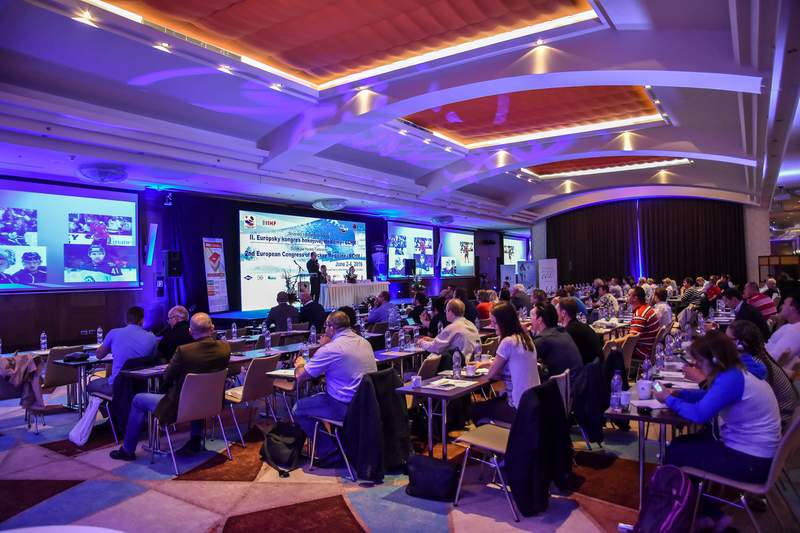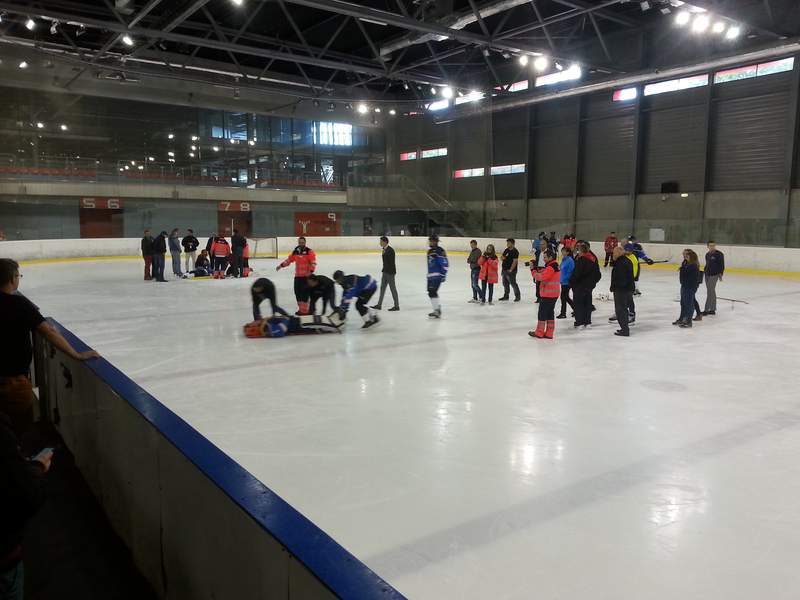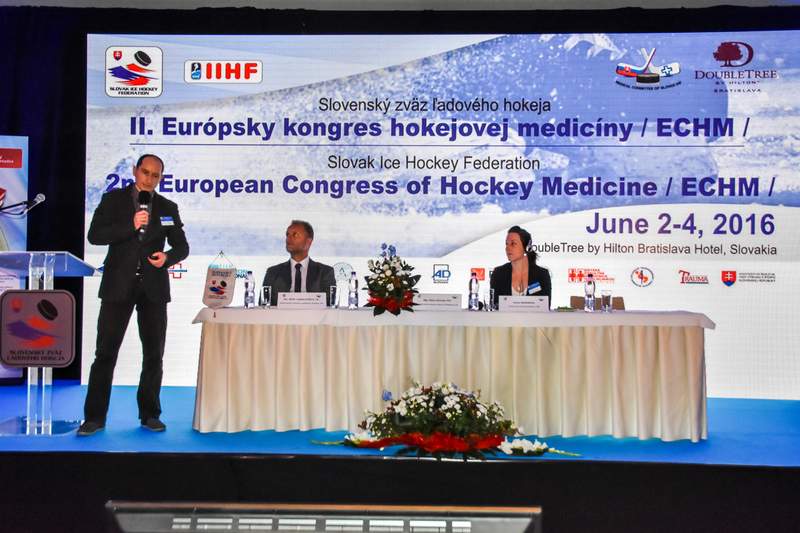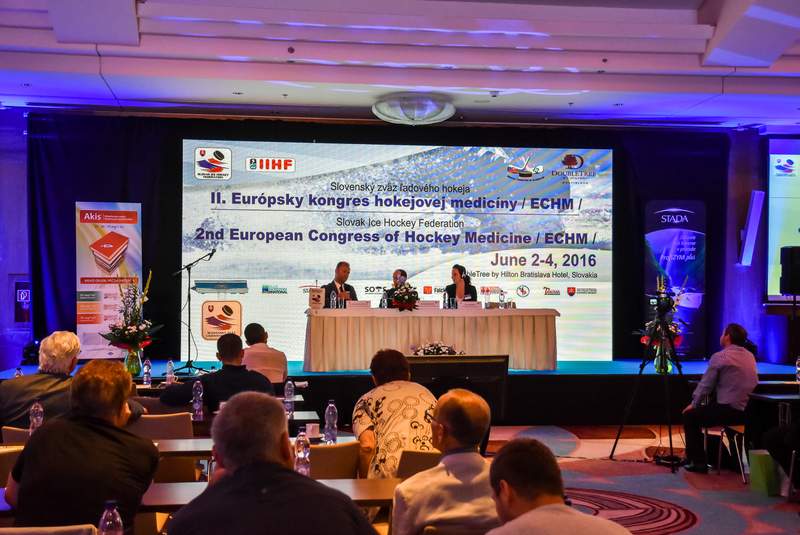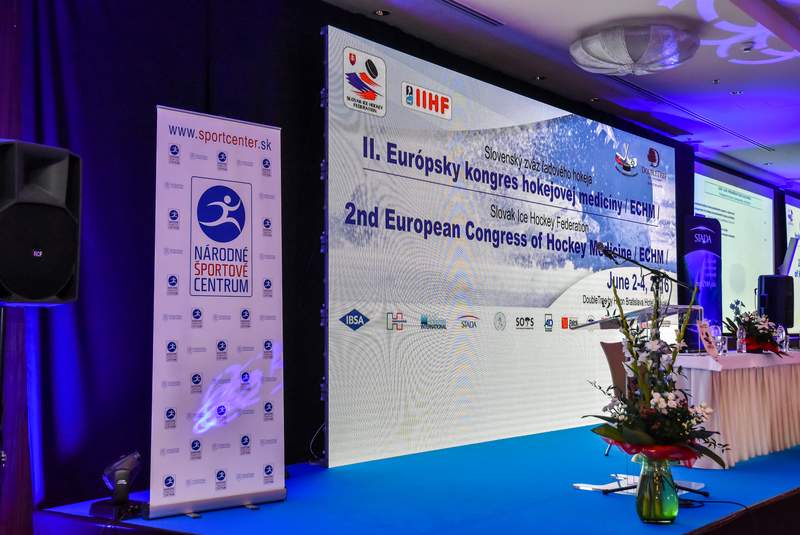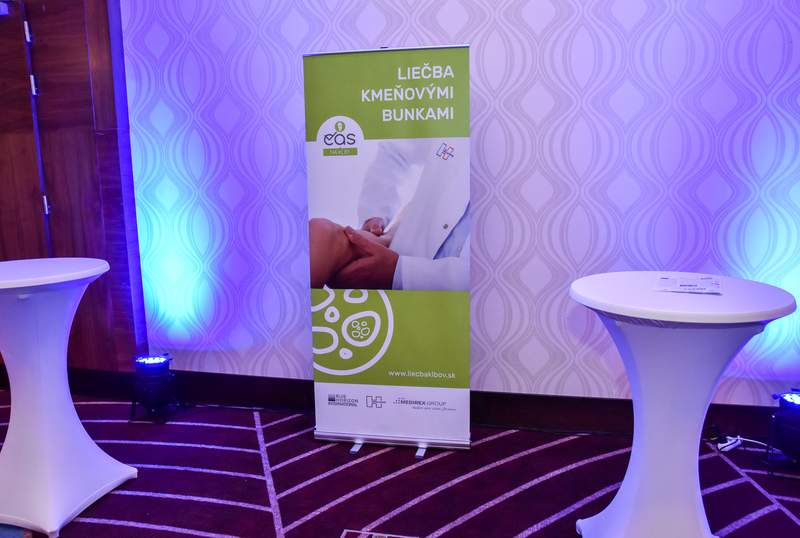Health cares for athletes - modern trends
IV. INTERNATIONAL SPORT MEDICINE CONGRESS
25.5.2021
Bratislava – the center of European hockey medicine – Edition two

Two hundreds of participants from thirteen countries had the possibility to listen to fifty lectures and exchange their professional experiences and knowledge from the field of sports and especially ice hockey medicine. For the second time, the medical committee of Slovak Ice Hockey Federation (SIHF) set up a center of hockey medicine in Bratislava – the capital of Slovakia. Wide spectrum of participants included doctors, physios, masseurs, but also coaches, game officials and hockey parents.
IIHF attaches high importance to this congress and also supports it officially. As a matter of course, the members of IIHF medical committee can’t be missing – this year it was Dr. Markku Tuominnen from Finland and his Czech colleague Dr. Jan Nohejl. The cradle of ice hockey, which was two years ago, at the first edition of the event, represented by the chairman of this commitee Mark Aubry, was now represented by a Canadian lady, Pearle Nerenberg.
Almost ten hours long friday’s schedule was divided into four lecture blocks with total of 17 presentations from top European and overseas experts. Lectures dealing with acute body conditions with the risks of sudden death were linked with the workshop of first aid which followed afterwards on the ice of Ondrej Nepela Arena. It was lead by the most experienced ones – the instructors from Falck Academy in the front with Chief/Senior instructor Miroslav Nagy and lectors of SIHF medical committee.
All day intensive saturday’s schedule offered topics of injuries, nutrition, doping and sport medicine. The concussion was the main topic within the block of injuries in ice hockey. As emphasized by a chief physician Juraj Vyletelka, there is only approx. ten percent of patients after suffering concussion who also suffer amnesia. Many of in-game treated players do not continue with any after game medical consultation, or even tend to hide the symptoms. This leads to increasing the risk of serious or even life threatening conditions after repeated head injuries. “Prevention and informing the players of all the possible risks should be the high priority, because the after injury care and treatment, can already be a late intervention to the life of individuals”, chief physician Vyletelka added.
Markku Tuomminen linked up the facts with exact statistics, done by IIHF. After eight years (2006-2015) of collecting data from women and junior /senior world championships, the outcome is decreasing the frequency of concussions, also due to the use of flexible boards at the arenas. However, if we compare the data from other international events, the number of concussions increases, especially in junior categories. The most injuries during world championships is recorded as lower body injuries and mostly occur in second and third period of the games, while there is no significant difference between the positions played.
Another injury statistics was added by Martin Vančo, in charge of collecting the data from competitions governed by SIHF during the season. „We have compulsory injury data collecting in top leagues of seniors, U20 and U18. Most frequent injury based on data from Slovakia is a cut in the face area, most injuries occur in second period and the highest risk of injury is in U20 category. We recorded 181 injuries in senior top league, 149 cases in U20, 95 cases in U18 and 1 injured game official.” Based on this presentation, Markku Tuominnen offered cooperation with SIHF to integrate this data into worldwide statistics.
Performance of Slovak national team at World Seniors in Petersburg from the point of medicine was evaluated by Ján Grauzel, national team doctor, who was unusually busy at this event. He expressed his hope of more coaches and game officials attending this type of seminars, because information provided here are essential for individual ability to judge the severity of not only the injury situations.
“Wellbeing, in-game mental comfort and progression of players performance is based on many factors. From the early age the players should be treated the way which increases the freedom of their actions, leads them to be independent, able to grow as a personality and with a proper amount of passion for the sport.” approvingly affirmed Diana Kosová and František Hál, both sport psychologists and mental coaches.
Afternoon block was mainly about topics like doping and the use of illegal substances. Žaneta Csaderová, director of Slovak Antidoping Agency (ADA), informed the participants about drug testing of youth hockey players, which ADA realized in cooperation with SIHF medical committee. Almost 200 screening tests were done, unfortunately some of them positive (mainly THC). “Punishments for this violations are serious and in case of repetition, the consequences are devastating not only for the player himself but even for a team or club. It is our responsibility to continue in this trend of antidoping prevention, “ emphasized in the discussion Andrea Švrčková, chairman of SIHF medical committee.
Dr. Valentova informed the audience about the effects of marijuana as one of the most common drugs and described where and how is it possible to result a positive finding in the test. She also warned about the existence of new synthetic drugs (canabis like), which they are able to test for. Unfortunately there is already a few of mortal cases individually recorded after use of these.
2nd European congress of hockey medicine provided many up to date topics, belonging to the field of business of every hockey federation. Professional skills in providing firs aid on ice surface should be a matter of course in every club and practicing of it is supposed to be a part of curricula not only for medical staff but also for players, coaches and game officials. “We are very glad of the fact of smooth set up cooperation with Slovak clubs and game officials and also with the increasing tendency of expertness of all ice hockey involved persons, “ Andrea Švrčková, the congress initiator an director proudly added.
Many thanks belong to all the participants, to IIHF for the support and also to the partner companies, whose active participation was essential for event like this, which otherwise wouldn’t be possible to organize.
Voices after congress
Igor Nemeček (SIHF president)
“Thanks to everyone who helped this unique event to happen here in Bratislava again after two years. It was my honor to welcome the participants from the hockey countries such as Canada, USA, Russia, Sweden, Finland and many other. I believe the congress provided a number of interesting knowledge and everybody had a nice time in Bratislava.
Jan Nohejl (IIHF medical committee member)
For IIHF the health and safety of the players is the number one priority. That’s why IIHF medical committee strongly appreciates the activity of SIHF, who organizes this event attended by doctors, physiotherapists and other experts from 13 countries. Congress like this is organized only by Toronto for NHL and Slovakia.”
Pearle Nerenberg (Hockey Nutrition Network, Montreal, Canada)
„I thoroughly enjoyed the European Congress of Hockey Medicine. The most important topics in hockey today were thoroughly presented with quality research to back up the concluding statements. It was refreshing to see that the scientific method is of high value to the European hockey federations. I believe that those federations who apply the information presented will elevate their hockey programs to the next level.“
Dušan Benický (Hockey Performance Centre, Kanada)
“Your event was inspiring. The quality of many lectures offered effective “cure” for many of the hockey “pains”. I’ll be very happy to come again and will recommend this event to everyone who wants to grow professionally. Thank you for the possibility to contribute.”
Milan Novák (Region West SIHF president, international game official)
“As always, Hockey medicine congress provided a plenty of up to date information, presented by top specialists. Sport nowadays is a science and a medicine is in close relationship to it. It is essential for all hockey experts, including us game officials, to improve our skills and educate ourselves at all times. That’s the only way to cope with modern hockey and to get to higher levels.
